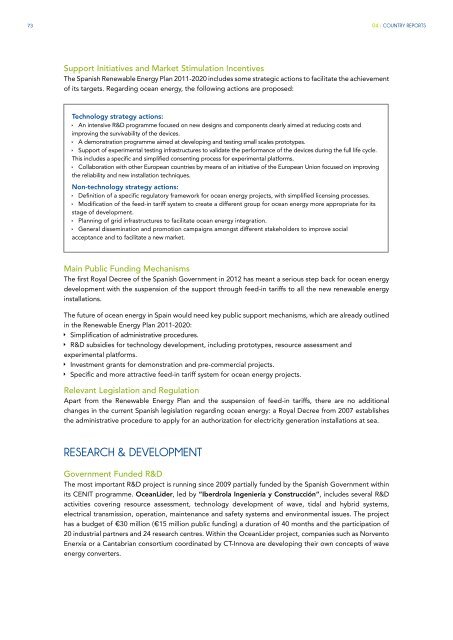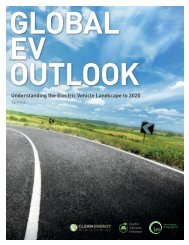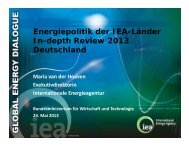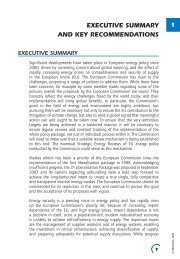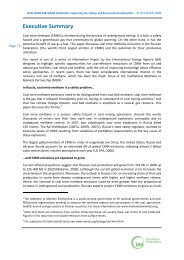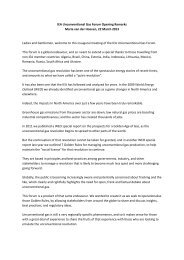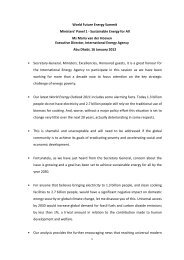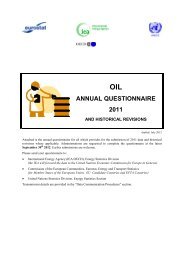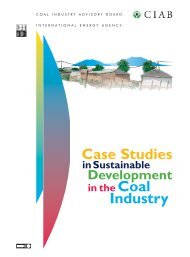OES Annual Report 2012 - Ocean Energy Systems
OES Annual Report 2012 - Ocean Energy Systems
OES Annual Report 2012 - Ocean Energy Systems
You also want an ePaper? Increase the reach of your titles
YUMPU automatically turns print PDFs into web optimized ePapers that Google loves.
73<br />
04 / COUNTRY REPORTS<br />
Support Initiatives and Market Stimulation Incentives<br />
The Spanish Renewable <strong>Energy</strong> Plan 2011-2020 includes some strategic actions to facilitate the achievement<br />
of its targets. Regarding ocean energy, the following actions are proposed:<br />
Technology strategy actions:<br />
ÌÌ<br />
An intensive R&D programme focused on new designs and components clearly aimed at reducing costs and<br />
improving the survivability of the devices.<br />
ÌÌ<br />
A demonstration programme aimed at developing and testing small scales prototypes.<br />
ÌÌ<br />
Support of experimental testing infrastructures to validate the performance of the devices during the full life cycle.<br />
This includes a specific and simplified consenting process for experimental platforms.<br />
ÌÌ<br />
Collaboration with other European countries by means of an initiative of the European Union focused on improving<br />
the reliability and new installation techniques.<br />
Non-technology strategy actions:<br />
ÌÌ<br />
Definition of a specific regulatory framework for ocean energy projects, with simplified licensing processes.<br />
ÌÌ<br />
Modification of the feed-in tariff system to create a different group for ocean energy more appropriate for its<br />
stage of development.<br />
ÌÌ<br />
Planning of grid infrastructures to facilitate ocean energy integration.<br />
ÌÌ<br />
General dissemination and promotion campaigns amongst different stakeholders to improve social<br />
acceptance and to facilitate a new market.<br />
Main Public Funding Mechanisms<br />
The first Royal Decree of the Spanish Government in <strong>2012</strong> has meant a serious step back for ocean energy<br />
development with the suspension of the support through feed-in tariffs to all the new renewable energy<br />
installations.<br />
The future of ocean energy in Spain would need key public support mechanisms, which are already outlined<br />
in the Renewable <strong>Energy</strong> Plan 2011-2020:<br />
ÌÌ<br />
Simplification of administrative procedures.<br />
ÌÌ<br />
R&D subsidies for technology development, including prototypes, resource assessment and<br />
experimental platforms.<br />
ÌÌ<br />
Investment grants for demonstration and pre-commercial projects.<br />
ÌÌ<br />
Specific and more attractive feed-in tariff system for ocean energy projects.<br />
Relevant Legislation and Regulation<br />
Apart from the Renewable <strong>Energy</strong> Plan and the suspension of feed-in tariffs, there are no additional<br />
changes in the current Spanish legislation regarding ocean energy: a Royal Decree from 2007 establishes<br />
the administrative procedure to apply for an authorization for electricity generation installations at sea.<br />
RESEARCH & DEVELOPMENT<br />
Government Funded R&D<br />
The most important R&D project is running since 2009 partially funded by the Spanish Government within<br />
its CENIT programme. <strong>Ocean</strong>Lider, led by “Iberdrola Ingeniería y Construcción”, includes several R&D<br />
activities covering resource assessment, technology development of wave, tidal and hybrid systems,<br />
electrical transmission, operation, maintenance and safety systems and environmental issues. The project<br />
has a budget of €30 million (€15 million public funding) a duration of 40 months and the participation of<br />
20 industrial partners and 24 research centres. Within the <strong>Ocean</strong>Lider project, companies such as Norvento<br />
Enerxía or a Cantabrian consortium coordinated by CT-Innova are developing their own concepts of wave<br />
energy converters.


